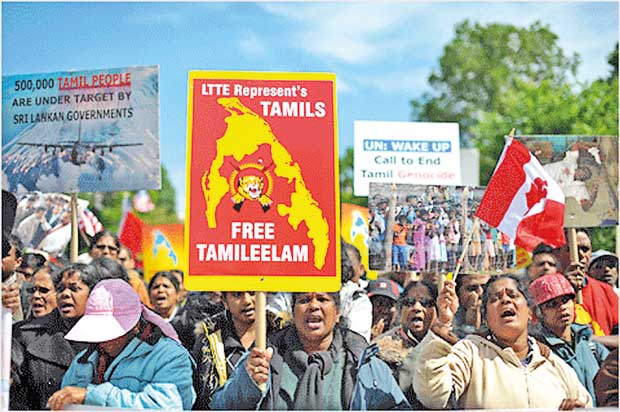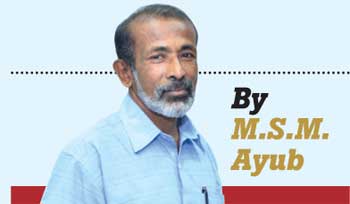Reply To:
Name - Reply Comment
Last Updated : 2024-04-19 00:03:00

For the first time since the famous Indo-Sri Lanka Accord was signed 29 years ago, India had this week officially and unambiguously repudiated one of the major provisions of that Accord. Indian Foreign Secretary S. Jaishankar during his three day visit to Sri Lanka told the Eelam Peoples’ Revolutionary Liberation Front (EPRLF) on Monday that India would not be pressing Sri Lanka to merge the Northern and Eastern Provinces to form a single Tamil-majority, Tamil-speaking province as envisaged by the Indo-Sri Lanka Accord of 1987.
He was responding to a request by the leader of the EPRLF, Suresh Premachandran, that India should honour its promise to keep the North and East united as one administrative unit. According to Indian Express Premachandran had pointed out that India has a moral responsibility to ask the Sri Lankan government to re-merge the North and East as it is a part of the Indo-Sri Lanka Accord of  1987.
1987.
If the Accord is still valid, every part of it should be deemed to be equally valid and implemented, he had argued while interestingly recalling that former Prime Minister Rajiv Gandhi had promised that the merger would remain and that the proposed referendum would not be held. However, Jaishankar had told Premachandran that much water has flowed under the bridge since 1987 and it will be better for all concerned to make use of the various windows of opportunity which have opened up recently with the change of regime in Colombo and secure the rights of Tamils. He had further argued that it would not be wise to hold every other matter hostage to one issue - the merger of the North and East.
This statement by the senior Indian official might have disappointed many Tamils in the country as well as the Tamil diaspora as they believe with or without reasons that their problems would be resolved through a settlement that includes the merger of these two provinces. But India had always handled Sri Lanka’s Tamil question keeping its interest in mind. The factors that pushed India to support the merger and the armed struggle of the Sri Lankan Tamil youth when the Indo-Lanka Accord was signed were different from the present circumstances under which Jaishanker absolves India from accepting some of the Tamil demands.
Towards the 1970s president J.R. Jayawardene had provoked Indian leaders, especially Prime Minister Indira Gandhi who was a close ally of the socialist bloc in the bipolar world that prevailed then, by pursuing a policy bias towards the capitalist bloc headed by the USA. His allegiance to the West was seen by the Indian leaders as a part of the Western scheme to surround India, as Pakistan and Bangladesh already had strong links with the anti-socialist camp. At the same time India conveniently used the issue of more than 100,000 Sri Lankan Tamil refugees who had fled to India to escape the armed conflict in the North and the East as a ruse to meddle in the affairs of the island.
Indian leaders in the process accepted the standpoint of Tamil leaders and pressurized the Sri Lankan government. It was against that backdrop that India supported the merger of Northern and the Eastern Provinces among other demands, in spite of the mixed demographic composition of the Eastern Province. Today India is definitely wary of Sri Lanka’s increasing economic ties with China, but it does not seem to want to use the same strategies it did in the 1980s to tame Sri Lanka. Today India looks forward to economic opportunities similar to those gained by China in the island for which Tamil demands are not so relevant.
Tamil leaders have been stressing for the past four decades mainly four main demands in their pursuit to a solution to the ethnic problem, namely recognition of right of the Tamil people to self-determination, merger of Northern and the Eastern Provinces, devolution of power and a federal form of governance.And they had in deed achieved four of the three goals for some extent through the Indo- Lanka Accord, but the merger of provinces was annulled by a Supreme Court ruling in 2006.
It is in a way ironic that the parties that are pushing for devolution of power demand for the amalgamation of Northern and Eastern provinces as well. Devolution of power is a means to take the administration to the people by carving out smaller units of administration. The smaller the units, the easier the dealings with their local political administrators.
The merger of Northern and the eastern Provinces was initially demanded by Tamil political parties and armed groups in the late seventies not in an economic perspective. It was purely a political demand based on an ethnic standpoint. In fact it was a shrewd concept put forward to use as a stepping stone for a future separate Tamil State. Since the government had sensed the motive it had opposed the demand from the beginning.
When India intervened in the Sri Lankan ethnic issue in the early 1980s it had to strike a balance between the viewpoints of the government and the Tamil groups at least overtly while supporting the Tamil demands shrewdly and cautiously. Thus, Prime Minister Rajiv Gandhi convinced President Jayawardene to accept a temporary merger of Northrn and the Eastern Provinces until a referendum on the continuity of it in the eastern Province is held, while promising the Tamil leaders that the referendum in the East would never be held. This is what Premachandran had reminded Jaishankar of, on Monday.
After this deception of President Jayawardene by Premier Gandhi, Sri Lankan authorities had included that agreement between the two leaders in the Provincial Councils Act promulgated in 1987. Accordingly, President Jayawardene had to merge the two provinces once the Tamil armed groups laid down arms under the provisions of the Accord.
However, fighting between the Indian forces and the LTTE broke out, in late 1987, making the merger legally impractical.Then India persuaded President Jayawardene to amend the Provincial Council Act using Presidential powers and emergency regulations in order to get the two provinces merged.
Therefore, it is clear that the amalgamation of Northern and the Eastern Provinces was effected with India’s sheer deception and coercion and not with an understanding among the stakeholders. This was the moral basis that was employed apart from the Sinhala nationalistic agenda for the annulment of this merger in the legal battle on the matter in 2005/2006.
All Ceylon Tamil Congress leader the late Kumar Ponnambalam had realized the undemocratic nature of the demand for the merger of the whole multi-ethnic Eastern Province with the Northern Province and he along with Sri Lanka Muslim Congress leader the late M.H.M.Ashraff worked out a plan in 1988 to merge only the Tamil dominated areas of the Eastern Province with the Northern Province while amalgamating all Muslim areas in the two provinces as a separate administrative unit.
Tamil and Muslim parties now have to look at the problem afresh in the post-war context. Now that the Tamils have lost their main bargaining power, the LTTE and the Indian support while the government’s position with regard to the merger of provinces having been strengthened after their de-merger and having elections twice for the Eastern Provincial Council, the demand for the merger seems to be impractical or sometimes ridiculous.It is now just a prestige issue.
In the same way, Muslim leaders in the East have to reconsider the validity of a Muslim Provincial Council in the light of the institution of the Eastern Provincial Council in 2007 and other post-war scenarios. The need of the day is integration of various communities without harming the identity as well as their rights them.
John Sunday, 26 February 2017 01:00 AM
India is neither for Tamils nor Sinhalese,and the likely scenario is the whole of Sri Lanka will be taken over by India within the next 30 years.There is not much Sri Lanka can do.

Add comment
Comments will be edited (grammar, spelling and slang) and authorized at the discretion of Daily Mirror online. The website also has the right not to publish selected comments.
Reply To:
Name - Reply Comment
On March 26, a couple arriving from Thailand was arrested with 88 live animal
According to villagers from Naula-Moragolla out of 105 families 80 can afford
Is the situation in Sri Lanka so grim that locals harbour hope that they coul
A recent post on social media revealed that three purple-faced langurs near t